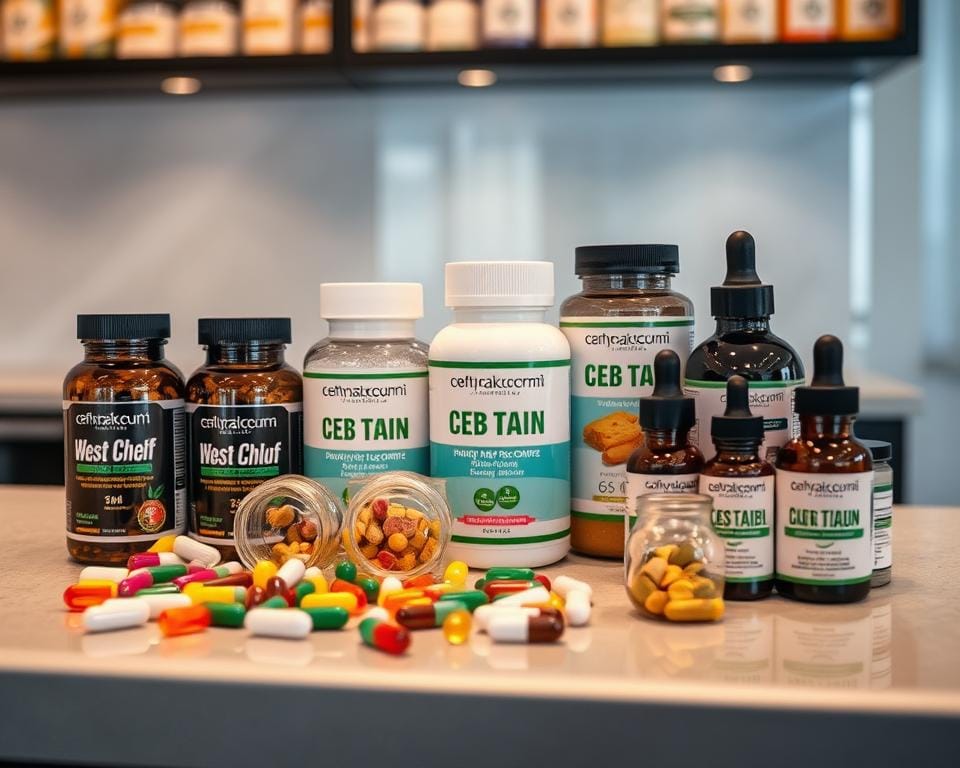Table of Contents
Did you know that about 45% of Americans are trying to lose weight? Over 60% of them use weight loss supplements1. This guide will cover the best weight loss supplements, their effectiveness, safety, and legal aspects.
Finding the right weight loss supplement can be tough. We’ll share insights from health experts and research. You’ll learn about the top weight loss solutions and proven fat burners.
We’ll look at different types of weight loss supplements and how they work. Whether you need thermogenics, appetite suppressants, or probiotics, we’ve got you covered. Our goal is to help you safely and effectively lose weight.

Knowing how dietary supplements work can really help with weight loss. For example, green tea extract can boost fat burning by 17% during exercise1. Stay with us as we reveal the truth and the latest in weight loss supplements.
Understanding Weight Loss Supplements
Weight loss supplements are dietary aids that help with weight loss. They don’t need FDA approval before hitting the market. These supplements have vitamins, minerals, fiber, caffeine, and herbs. They claim to boost metabolism, increase energy, or burn fat.
But, many supplements lack strong scientific proof of their effectiveness23.
What Are Weight Loss Supplements?
Weight loss supplements combine natural or synthetic ingredients to help with weight loss. They often include African mango, beta-glucans, caffeine, calcium, capsaicin, and green coffee bean extract3. They aim to boost diets, energy levels, and fat burning.
But, studies show they might not work as well as expected. For instance, a study on raspberry ketone showed a 4.2-pound weight loss in 8 weeks. Those on a placebo lost only 0.9 pounds2.
How Do They Work?
Weight loss supplements work in different ways. Ingredients like caffeine and capsaicin aim to increase metabolism and calorie burn. But, caffeine can lead to tolerance, reducing its weight loss effect over time3.
Other ingredients, like glucomannan, might help with cholesterol and blood sugar without much weight loss3. Safety is a big concern, as some ingredients, like ephedra, have caused serious side effects. This led to its ban by the FDA2.
Regulation and Safety of Weight Loss Supplements
When it comes to weight loss supplements, safety and regulation are key. The FDA checks the safety of these products, but it doesn’t approve them before they hit the market. This means there’s a risk of hidden ingredients that could harm our health.
Some weight loss products might cause headaches, stomach problems, or even serious issues like liver damage or heart problems4. It’s important to remember that the FDA doesn’t require proof of safety or effectiveness before these products are sold4. This can lead to a lack of regulation in the diet supplement market.
Choosing supplements wisely and talking to a healthcare professional before using them is crucial. This is especially true because of the risk of harmful side effects.

The cost of fat trappers and fat burners can be quite high, ranging from $50 to hundreds of dollars a month5. This makes it even more important to make smart choices. Products like ephedra have been linked to heart attacks and strokes, showing the need for strict safety rules5.
Combining a healthy diet with regular exercise is the best way to lose weight5. The FDA plays a big role, but it’s up to us to pick products that are safe and effective for our health.
Types of Weight Loss Supplements
Weight loss supplements come in many forms to help people manage their weight. They work in different ways, and their safety and effectiveness can vary. It’s important to understand how they interact with our bodies.

Thermogenics
Thermogenics boost your metabolism to burn more calories. They often include caffeine and green tea extract. These supplements aim to increase your body’s temperature and speed up metabolism for weight loss.
Appetite Suppressants
Appetite suppressants reduce calorie intake by making you feel full. They affect your brain’s hunger signals. For example, phentermine was once approved for weight loss, helping users lose about 5% of their body weight6. Naltrexone-bupropion can also lead to a 5-10% weight loss6.
Fat Blockers
Fat blockers stop your body from absorbing dietary fats. Orlistat, a well-known fat blocker, can lead to a 5% weight loss when taken correctly6. However, they might cause stomach problems.
Carb Blockers
Carb blockers stop carbs from being digested and absorbed. They often use white kidney bean extracts. This can help those who struggle with carb cravings. Since nearly 68% of American adults are overweight or obese7, carb blockers could be helpful. Always talk to a healthcare professional before starting any supplement, as many people use them without advice7.
Top 5 Best Weight Loss Supplements
Green tea extract and caffeine-based supplements are top picks for weight loss. They boost metabolism. Probiotics and synbiotics also help by improving gut health.
Green Tea Extract
Green tea extract is a top metabolism booster. It’s full of antioxidants that help burn fat and increase metabolic rate during exercise. Studies show it helps with weight loss and improves metabolic health8.

Caffeine-Based Supplements
Caffeine-based supplements are also popular for weight loss. They increase energy and help burn fat. Caffeine boosts thermogenesis, turning calories into energy for weight loss. It also improves focus and physical performance, making workouts better9.
Probiotics and Synbiotics
Probiotics and synbiotics are key for weight management. They balance gut flora. A review of six studies found they reduced body weight, BMI, and waist circumference in nearly 66.6% of cases. The most effective strains were Bifidobacterium and Lactobacillus8.
In conclusion, supplements like green tea extract, caffeine, and probiotics are great for weight loss. They work in different ways. Adding them to a healthy diet and exercise routine can lead to better weight management and health.
Thermogenics: Increasing Your Metabolism
Thermogenics are known for boosting metabolism and fat burning. They are often used in weight loss plans to burn more calories. Understanding how they work helps us see their value in managing weight.
How Thermogenics Work
Thermogenics stimulate the central nervous system, raising the body’s metabolic rate. They start thermogenesis, a process that burns calories by generating heat. Studies show caffeine can increase calorie burning by about 0.1 calories per milligram in 24 hours.
A 150 mg pill can burn an extra 15 calories10. Effective doses of caffeine for metabolism range from 1.4–2.3 mg per pound of body weight10. Female participants in a study saw a 121 kcal/day increase in resting energy expenditure at 30 minutes and 166 kcal/day at 60 minutes post-ingestion11.
Popular Thermogenic Ingredients: Caffeine, Green Tea Extract
Caffeine and green tea extract are top thermogenic ingredients. Caffeinated green tea supplements can increase metabolism by 4% and boost fat burning by 16% in 24 hours10. Daily use of green tea supplements for 12 weeks resulted in a 0.1 pounds (0.04 kg) weight loss and a 0.1 inches (0.2 cm) waist size reduction10.
Another review found daily green tea use resulted in a 2.9 pounds (1.3 kg) weight loss over 12 weeks10. Caffeine, a key ingredient, also enhances energy expenditure and aids in weight loss.

Capsaicin, found in some slimming pills, can boost metabolism by about 50 calories per day10. Dieters taking 2.5 mg of capsaicin with meals burned 10% more fat in 24 hours compared to a control group10. The combination of these ingredients makes thermogenic supplements a valuable weight loss tool.
Probiotics for Weight Loss
Probiotics, known as “good bacteria,” might help with weight management. Adding probiotics to our daily routine could bring several benefits, like keeping our gut healthy. Studies show that people with obesity often have different gut bacteria than those with a healthy weight12.
Research has shown that probiotics can be very effective. For example, a 2016 study found that taking Bifidobacterium lactis B420 daily for six months helped control body fat and reduced waist size13. Another study in 2020 showed that taking certain Lactobacillus and Bifidobacterium strains for six months led to lower weight and waist size13.
More studies have found that specific probiotics can reduce body weight and fat in clinical settings13. A study found that taking Lactobacillus sakei for 12 weeks resulted in less body fat and waist size compared to a placebo12.
The success of probiotics in weight loss depends on several factors. These include the amount taken, how long, the type of probiotic, age, and starting weight. A study showed that VSL#3 helped prevent weight gain and insulin resistance, but more research is needed14. Probiotics can also increase hormones that help control appetite12.
We offer top probiotic supplements like Bariatric Advantage FloraVantage Control with 10 billion CFU, mindbodygreen probiotic+ with 32 billion CFU, and Genestra Brands HMF Metabolic with 50 billion CFU13.
Probiotics can also help by reducing fat absorption and increasing fat excretion12. Studies have shown that Lactobacillus gasseri can lower BMI and body fat, even without dieting14.
| Probiotic Supplement | CFU Count | Notable Ingredients |
|---|---|---|
| Bariatric Advantage FloraVantage Control | 10 billion | Bifidobacterium lactis B420 |
| mindbodygreen probiotic+ | 32 billion | Lactobacillus and Bifidobacterium strains |
| Genestra Brands HMF Metabolic | 50 billion | Various Lactobacillus and Bifidobacterium strains |
How to Choose the Best Weight Loss Supplements
Choosing the right weight loss supplements can be tough. There are so many options out there. We need to look at a few key things to pick the best one.
Factors to Consider
When picking weight loss supplements, safety, how well they work, and quality are key. About 70% of American adults are overweight or obese15. This makes finding good solutions very important.
Supplements like Green Tea Extract can help by increasing your metabolism. This can make you burn more energy by 4-9%15. Also, medicines like Orlistat can stop up to 30% of fat from your food from being absorbed15. Thinking about these points can help you make a smart choice.
Reading Product Labels
Another important step is to read the labels carefully. You need to know what’s in the supplement, how much, and what it can do. For example, berberine has been shown to help people with obesity lose weight and inches around their waist in 8 weeks or more16.
Understanding what’s in diet pills helps you see if they work and if they’re safe.
Consulting Healthcare Professionals
Lastly, always talk to a healthcare professional before starting any supplement. They can give advice based on your health and needs. It’s also good to check in every few months to see how you’re doing and make changes if needed15.
This makes sure the supplement is not only working for you but is also safe to use for a long time.
Potential Side Effects of Weight Loss Supplements
It’s important to know the side effects of diet pills and weight loss products. Almost 50% of people taking GLP-1 medications have GI side effects like nausea and bloating17. These symptoms can make it hard to stick to the treatment plan. Semaglutide can cause nausea, diarrhea, and stomach pain in many users18.
Some weight loss products, like tirzepatide, can cause serious problems like stomach issues and kidney failure18. Doctors start with a low dose and increase it slowly. Eating less fatty and sugary foods can help reduce these side effects17.
The U.S. weight-loss supplement market is not well regulated, which increases the risk of harmful ingredients19. Young and healthy people have experienced heart damage and irregular heartbeat from these supplements19. The use of DMAA has also caused severe side effects19.
Weight-loss supplements can harm the liver and cause high blood pressure, leading to stroke or brain bleeding19. Vision problems, like cataracts, can also occur due to banned substances like DNP19. It’s crucial to talk to a healthcare professional before starting any weight-loss plan. Being aware and making informed choices can help avoid these risks and ensure a safer journey to our health goals.
Natural vs. Synthetic Weight Loss Supplements
In today’s health-conscious world, we face a choice between natural and synthetic weight loss supplements. Each type has its own benefits and risks. Knowing these can help us make better choices for our health.
Benefits of Natural Supplements
Natural supplements, like green tea extract and choline, are often seen as safer. They come from nature and can help improve our metabolic health. This is especially true for those who are overweight or obese natural weight loss supplements20.
Natural vitamin E is also better absorbed than synthetic vitamin E. This makes it a safer choice for those looking for effective supplements21. Eating natural foods like fruits, vegetables, and whole grains can also lower the risk of chronic diseases21.
Risks Associated with Synthetic Supplements
Synthetic supplements may offer a set amount of ingredients, but they can be risky. Many unsafe weight loss supplements are still sold online, posing dangers to people who buy them22. For example, Ephedrine, a synthetic ingredient, can cause serious side effects like high blood pressure and heart attacks22.
Moreover, synthetic diet pills can harm the liver, causing about 20% of liver damage in the U.S22.
It’s important to know the risks of synthetic diet pills. This highlights the need to choose natural supplements wisely. Synthetic nutrients, like multivitamins, may not always work as promised. They may not lower the risk of heart disease and cancer21. So, it’s key to think about our health and how supplements might interact with other medicines.
Let’s summarize with some statistics and comparisons:
| Supplement Type | Benefits | Risks |
|---|---|---|
| Natural | Improves metabolic health20 Twice the absorption rates for vitamin E21 Reduced risks of chronic diseases21 | Potential interactions with medications Misleading perceptions of safety |
| Synthetic | Controlled dosages Availability | Liver damage (20% of cases)22 Severe side effects like heart attacks, deaths from Ephedrine22 Inconsistent benefits vs. risks for multivitamins21 |
Effective Diet Pills: What You Need to Know
Looking into weight loss supplements can feel overwhelming. There are so many choices. Diet pills can help or harm your health journey.
Overview of Popular Diet Pills
The FDA has approved six prescription weight-loss drugs for long-term use. These include Bupropion-naltrexone (Contrave), Liraglutide (Saxenda), Orlistat (Xenical, Alli), Phentermine-topiramate (Qsymia), Semaglutide (Wegovy), and Setmelanotide (Imcivree)23. They are for people with a BMI over 30 or over 27 with serious health issues.
Medications like Liraglutide (Saxenda®) and Semaglutide (Wegovy®) are used with diet and exercise. They help with weight loss24.
Effectiveness and Risks
Prescription drugs can help you lose 3% to 12% more weight than diet and exercise alone after a year23. Losing 5% to 10% of your body weight can lower blood pressure and blood sugar levels23. But, it’s crucial to know the risks of these pills. Common side effects include nausea, constipation, and diarrhea23.
Some drugs can cause serious side effects, like high blood pressure and the risk of suicide with Bupropion-naltrexone23.
Short-term appetite suppressants are controlled substances. They include Benzphetamine (Didrex®, Regimex®) and Phentermine (Dipex-P®, Atti-Plex P®, Pro-Fast®). They are prescribed for up to 12 weeks24. Laws about their use vary by state24.
If you don’t lose weight after 3 to 6 months, your doctor might change your treatment plan23. Staying healthy after stopping medication can help prevent weight gain23.
Here’s a comparison of some popular diet pills:
| Drug | Effectiveness | Common Side Effects | Serious Side Effects |
|---|---|---|---|
| Liraglutide (Saxenda) | 3%-12% more weight loss than lifestyle changes alone | Nausea, diarrhea | None specified |
| Phentermine-topiramate (Qsymia) | 3%-12% more weight loss than lifestyle changes alone | Constipation, dry mouth | Elevated heart rate, birth defects if pregnant |
| Orlistat (Xenical, Alli) | 3%-12% more weight loss than lifestyle changes alone | Diarrhea, stomach pain | Rare severe liver injury |
| Bupropion-naltrexone (Contrave) | 3%-12% more weight loss than lifestyle changes alone | Nausea, constipation | Elevated blood pressure, risk of suicide |
| Semaglutide (Wegovy) | 3%-12% more weight loss than lifestyle changes alone | Nausea, vomiting | None specified |
Researching Weight Loss Supplements
Looking into weight loss supplements is key for anyone thinking about them. The global market for these products hit $254.9 billion in 2021. It’s expected to jump to $377.3 billion by 202625. This shows a big interest and investment in these products worldwide. But, it’s important to understand and analyze them well to ensure they are safe and work.
Reliable Sources of Information
Good places to find info on diet supplements include scientific studies, health reports, and advice from doctors. A 2021 review looked at over 300 studies. It found only 16 showed real weight loss25. Such detailed reviews help us see what supplements really do and avoid false ads. Also, talking to health groups like the World Health Organization and the National Institutes of Health can give us the lowdown on supplements. For example, supplements might not be as closely watched as prescription drugs, which can lead to problems with what’s really in them26.
Evaluating Scientific Evidence
Checking the science behind weight loss supplements is crucial for smart choices. A 2011 study on green coffee extract showed people lost about 5.4 pounds more than those taking a placebo25. A 2005 study with 176 overweight people found they lost 8-10 pounds in five weeks with glucomannan supplements25. It’s important to look at these numbers and the conditions of the studies.
Comparing and analyzing studies is very helpful. For example, a study on fish oil found it might help reduce belly fat when combined with healthy habits26.
| Supplement | Weight Loss Effect | Notes |
|---|---|---|
| Green Coffee Extract | 5.4 lbs | Compared to placebo25 |
| Glucomannan | 8-10 lbs | Over five weeks25 |
| Fish Oil | Decreases abdominal fat | With lifestyle changes26 |
So, by using reliable data from various sources and carefully checking it, we can make better choices about weight loss supplements.
Conclusion
We’ve covered the best weight loss supplements in this guide. We looked at different types, how they work, and their risks. Knowing about these supplements helps you make smart choices for your weight loss plan. This includes understanding the role of ingredients like thermogenics and probiotics, which studies show can lead to weight loss and BMI reduction27.
It’s also important to know about the safety and regulation of top weight loss products. Research shows that nearly 50% of “100% natural” weight loss supplements contain hidden drugs and ingredients28. Always talk to a healthcare professional before starting any supplement to avoid side effects.
Using these supplements with a healthy lifestyle, like eating well and exercising, makes them work better. Following dietary guidelines, like getting enough fiber and magnesium, also helps your health and weight loss27. We hope this guide has helped you understand how to pick the right supplements and navigate the weight loss market.
FAQ
What are weight loss supplements?
Weight loss supplements are products that help you lose weight. They boost your metabolism, reduce hunger, or block fat and carbs. You can find them as pills, powders, or liquids.
How do weight loss supplements work?
Supplements work in different ways. Some increase your metabolism (thermogenics). Others reduce hunger. Some block fat or carb absorption.
Are weight loss supplements safe?
Many supplements are safe when used as directed. But, always talk to a healthcare professional before starting. This is especially true if you have health issues or take other medicines.
What are thermogenics?
Thermogenics are supplements that increase your metabolism. They raise your body temperature, helping you burn more calories.
What ingredients are commonly found in thermogenic supplements?
Thermogenic supplements often have caffeine, green tea extract, and capsaicin. These boost your metabolism and energy.
What are appetite suppressants?
Appetite suppressants reduce hunger and food cravings. They help you eat less and consume fewer calories.
What are fat blockers and carb blockers?
Fat and carb blockers prevent your body from absorbing fats or carbs. This reduces calorie intake from these sources.
What are the best metabolism boosters?
Top metabolism boosters include green tea extract, caffeine, and certain probiotics. They improve gut health and metabolic efficiency.
How do thermogenics increase metabolism?
Thermogenics boost metabolism by stimulating your nervous system. They also raise your body temperature, burning more calories.
What are the benefits of natural weight loss supplements?
Natural supplements have fewer side effects. They’re often made from herbs and plants. They support weight loss in a gentle, sustainable way.
What risks are associated with synthetic diet pills?
Synthetic pills can have side effects like high heart rate and insomnia. Always talk to a doctor and read labels carefully.
What factors should I consider when choosing a weight loss supplement?
Consider your health, the supplement’s ingredients, and any side effects. Also, check if it’s safe and effective.
How should I read product labels for weight loss supplements?
Look for clear ingredient lists, dosage, and side effects on labels. Check for health authority approvals too.
What should I know about effective diet pills?
Effective pills target different body mechanisms, like metabolism or hunger. Use them with caution and under medical supervision.
Where can I find reliable information on weight loss supplements?
Find reliable info on FDA, NIH websites, and medical journals. Always check the scientific evidence behind claims.










